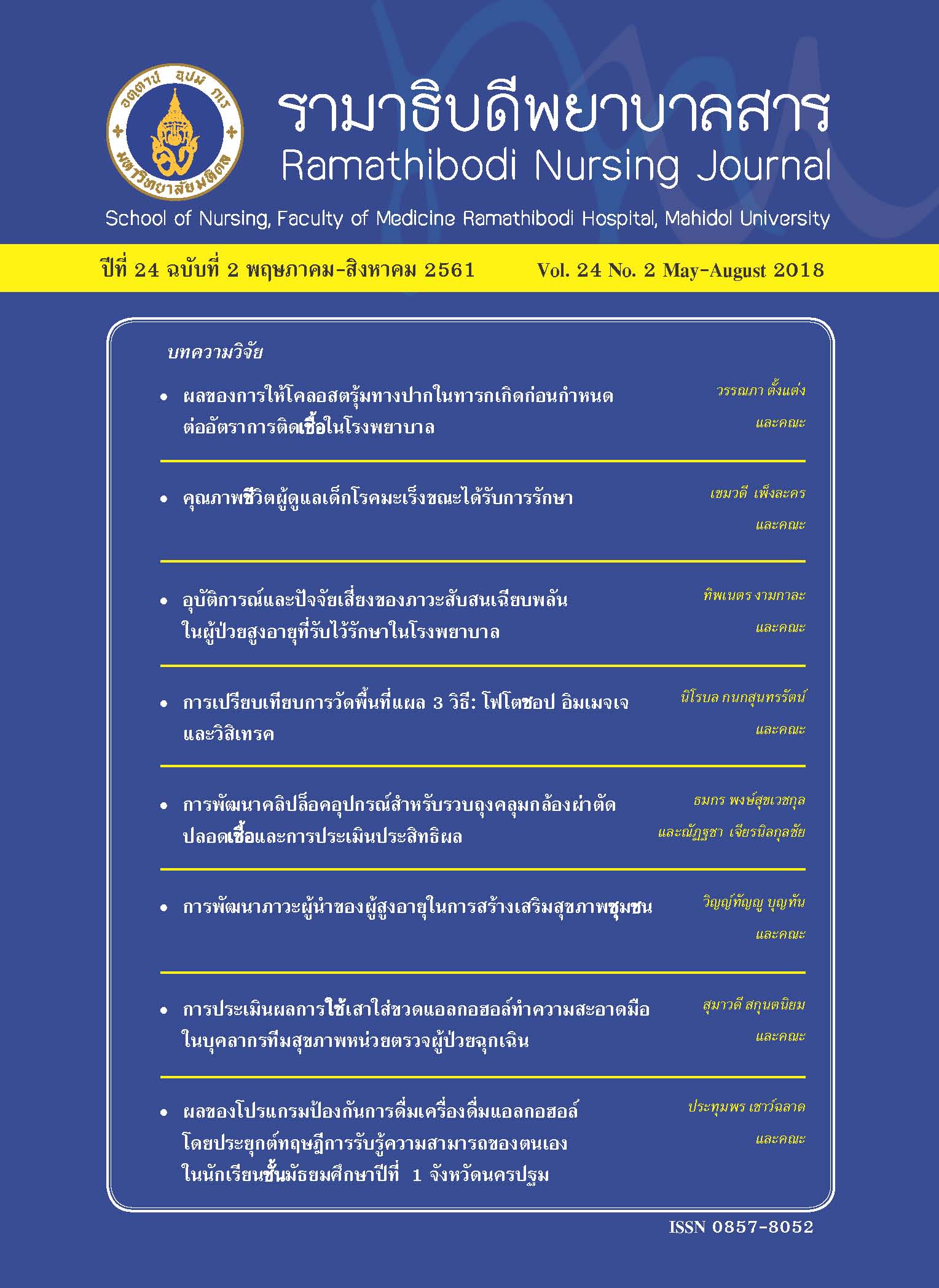Effects of an Alcohol Use Prevention Program Applying Self- Efficacy Theory among 7th Grade Students in Nakhon Pathom Province
Main Article Content
บทคัดย่อ
การวิจัยกึ่งทดลองนี้ มีวัตถุประสงค์เพื่อศึกษาผลของโปรแกรมป้องกันการดื่มเครื่องดื่มแอลกอฮอล์โดยประยุกต์ทฤษฎีการรับรู้ความสามารถของตนเองในนักเรียนชั้นมัธยมศึกษาปีที่ 1 ของโรงเรียนในเขตเทศบาล อำเภอเมือง จังหวัดนครปฐม ตัวอย่างแบ่งเป็น 2 กลุ่ม ประกอบด้วยกลุ่มทดลอง จำนวน 36 คน และกลุ่มเปรียบเทียบ จำนวน 35 คน ระยะเวลาการทดลอง 8 สัปดาห์ โดยจัดกิจกรรมทาง สุขศึกษา 4 สัปดาห์ต่อเนื่องกัน สัปดาห์ละ 1 วัน และติดตามผลในอีก 1 เดือน เก็บรวบรวมข้อมูลโดยใช้แบบสอบถาม 3 ช่วงเวลา ได้แก่ ก่อนการทดลอง หลังการทดลองในสัปดาห์ที่ 5 และระยะติดตามผลในสัปดาห์ที่ 8 วิเคราะห์ข้อมูลด้วยสถิติเชิงพรรณนา ได้แก่ ความถี่ ร้อยละ ค่าเฉลี่ย และส่วนเบี่ยงเบนมาตรฐาน และทดสอบความแตกต่างด้วยสถิติ Chi-square test, Fisher's exact test, Independent t-test และ Repeated Measures ANOVA
ผลการศึกษา พบว่า หลังการทดลองและติดตามผล กลุ่มทดลองมีความรู้ การรับรู้ความสามารถของตนเอง ความคาดหวังในผลลัพธ์ของการป้องกันการดื่มเครื่องดื่มแอลกอฮอล์ และพฤติกรรมป้องกันการดื่มเครื่องดื่มแอลกอฮอล์ดีขึ้นกว่าก่อนการทดลอง (p<.001) และดีกว่ากลุ่มเปรียบเทียบอย่างมีนัยสำคัญทางสถิติ (p<.001) ดังนั้น โปรแกรมนี้สามารถนำไปประยุกต์ใช้เพื่อป้องกันและชะลอการดื่มเครื่องดื่มแอลกอฮอล์ในวัยรุ่นตอนต้นได้
Article Details
บทความ ข้อมูล เนื้อหา รูปภาพ ฯลฯ ที่ได้รับการตีพิมพ์ในรามาธิบดีพยาบาลสาร ถือเป็นลิขสิทธิ์ของวารสาร หากบุคคลหรือหน่วยงานใดต้องการนำทั้งหมดหรือส่วนหนึ่งส่วนใดไปเผยแพร่หรือเพื่อกระทำการใด ใด จะต้องได้รับอนุญาตเป็นลายลักษณ์อักษรจากรามาธิบดีพยาบาลสารก่อนเท่านั้น
เอกสารอ้างอิง
29]. Available from: http://apps.who.int/iris/bitstream/10665/112736/1/9789240692763_eng.pdf
2. Department of Health. Alcohol consumption and impact in Thailand. 1st ed. Nonthaburi: The Grafton Systems
2013. (in Thai)
3. Tavorncharounrat N, Teerawattananon Y,Chayketkeaw U, Lertpitakpong C, Yotahsamut J, Thitiboonsuwan K, et
al. A study of social, health and economic costs of alcohol consumption in Thailand. Bangkok: Alcohol Problem
Research Center; 2008. (in Thai)
4. National Statistical Office. Health and welfare survey;2015 [cited 2016 December 19]. Available from: http://
service.nso.go.th/nso/nsopublish/themes/files/healthy/FormatPdf58.pdf.2013 (in Thai)
5. Department of Disease Control, Ministry of Public Health. Annual report 2013 the office of the board alcoholic
beverages. Bangkok: Sunder Film Partnership; 2013. (in Thai)
6. Asanongkanchai S, Meunkthong A, Thantanon T. Report of the alcohol consumption behavioral surveillance project
and health risk behaviors of secondary school students in Thailand. Bangkok: Pimdeekarnpim; 2013. (in Thai)
7. Corte C, Zucker RA. Self-concept disturbances: cognitive vulnerability for early drinking and early drunkenness in
adolescents at high risk for alcohol problem. Addict Behav. 2008; 33(2):1282-90.
8. Center for Alcohol Studies. Provincial alcohol report 2011. 1st ed. Nonthaburi: The Grafton Systems 2011. (in Thai)
9. Vorapong N, Wattanapongvanich S, Nateethong K, Ruangdejkorn P. Alcohol policy in Thailand 5P. 1st ed.
Bangkok: October Prints; 2016. (in Thai)
10. Henrirtte K, Frode A, Sturla S, Sabine K, Monica M. Effectiveness of school-based preventive interventions on
adolescent alcohol use: a meta-analysis of controlled trials. Subst Abuse Treat Prev Policy. 2014;48(9):1-11.
11. Pajares F, Urdan T. Self efficacy beliefs of adolescents. Greenwich, CT: Information Age Publishing; 2006.
12. Bandura A. Self-efficacy: toward a unifying theory of behavior change. Psychol Rev. 1977;84(2):191-215.
13. Victor JS, Brenda MD, Marshall HB, Irwin I. The role of self efficacy in achieving health behavior change. Health
Educ Q. 1986;13(1):73-91.
14. Kaewsuwan K. Self-efficacy program for rejection of adolescent alcohol behaviors. Thung Hua Chang district,
Lamphun province. [thesis]. Chiang Mai: Chiang Mai University; 2007. (in Thai)
15. Kairach P. Effects of motivation programs on self-efficacy and expectations for avoiding alcohol intake among early
adolescent boys in the 7th grade student. Public Health Nurs. 2009;26(1):1-18. (in Thai)
16. Kamolpornmongkol C. Effects of self-efficacy on selfefficacy and outcome expectations and alcohol refusal skills
of primary school students. [thesis]. Chonburi: Burapa University; 2007.(in Thai)
17. Worrapongtorn T. Principles of public health research. 3rd ed. Bangkok: Printing Chulalongkorn University; 1997.
(in Thai)
18. Mongkhanmanee V, Rumsuk P, Santipap Y. Teacher guide book the topic of health education and physical education in the7th grade. 9st ed. Bangkok: Prasanmite; 2012. (in Thai)
19. Mumalee S. Application of motivation theory for prevention and social support for alcohol drinking prevention among the 6th grade student, Udonthani province. Udonthani Hospital Medical Research. 2008;16(2):15-21. (in Thai)
20. Ponpaisan P. Effects of application of alcohol abuse prevention program on upper secondary school students in
Klongchai district in Kalasin province. [thesis]. Mahasarakam: Mahasarakam University; 2014. (in Thai)
21. Kammanee T. Teaching Patterns: a variety of options. Bangkok: Printing of Chulalongkorn University; 2008.
(in Thai)
22. Fungkajorn A. Effects of self-efficacy program on selfefficacy expectations in results and behavioral habits avoid
drinking alcohol in lower secondary school in Chonburi province. Public Health Nurs. 2009;30(3):41-54. (in Thai)


